Where the Sidewalk Ends Blu-ray Movie
HomeWhere the Sidewalk Ends Blu-ray Movie 
Limited Edition to 3000 - SOLD OUTTwilight Time | 1950 | 95 min | Not rated | Feb 16, 2016
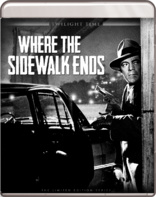
Movie rating
7.5 | / 10 |
Blu-ray rating
| Users | 0.0 | |
| Reviewer | 3.5 | |
| Overall | 3.5 |
Overview
Where the Sidewalk Ends (1950)
Det. Sgt. Mark Dixon wants to be something his old man wasn't: a guy on the right side of the law. But Dixon's vicious nature will get the better of him.
Starring: Dana Andrews, Gene Tierney, Gary Merrill, Bert Freed, Tom Tully (I)Director: Otto Preminger
| Film-Noir | 100% |
| Drama | 63% |
| Crime | Insignificant |
Specifications
Video
Video codec: MPEG-4 AVC
Video resolution: 1080p
Aspect ratio: 1.33:1
Original aspect ratio: 1.37:1
Audio
English: DTS-HD Master Audio Mono (48kHz, 24-bit)
Music: DTS-HD Master Audio 2.0 (48kHz, 24-bit)
Subtitles
English SDH
Discs
25GB Blu-ray Disc
Single disc (1 BD)
Playback
Region free
Review
Rating summary
| Movie | 3.5 | |
| Video | 5.0 | |
| Audio | 4.0 | |
| Extras | 2.0 | |
| Overall | 3.5 |
Where the Sidewalk Ends Blu-ray Movie Review
Watch your step.
Reviewed by Jeffrey Kauffman February 22, 2016Eddie Muller offers a laundry list of what he terms “bad cop noirs” in the supplemental commentary included on this new Blu-ray edition of Where the Sidewalk Ends, mentioning entries like 1951’s The Prowler and 1954’s Private Hell 36 as other salient examples of this subgenre. It’s notable that all of three of these films manage to avoid at least one staple of noir, the traditional femme fatale who leads a hapless schlub to his doom. This trio of “bad cop” films posit male characters who are already well on their way to (at least potential) doom before they even meet a woman, and it’s at least arguable that none of the females in these films fulfill the traditional role of a sloe eyed seductress who acts as a 20th century (fox or otherwise) Circe, luring the (anti-) hero toward moral turpitude. Interestingly, another supposed noir, a rather famous one, also eschewed the traditional femme fatale, in fact not “really” introducing the top billed woman until well into the film. That iconic outing was Otto Preminger’s 1944 classic Laura, a convoluted tale of its supposedly murdered title character. Where the Sidewalk Ends reunited Preminger with Laura’s two stars Gene Tierney and Dana Andrews, as well as Director of Photography Joseph LaShelle, and if lightning didn’t exactly strike twice, this later film is probably more securely in the dark and gritty ambience of a lot of noir than Laura’s fairly hoity toity, patrician proclivities were.
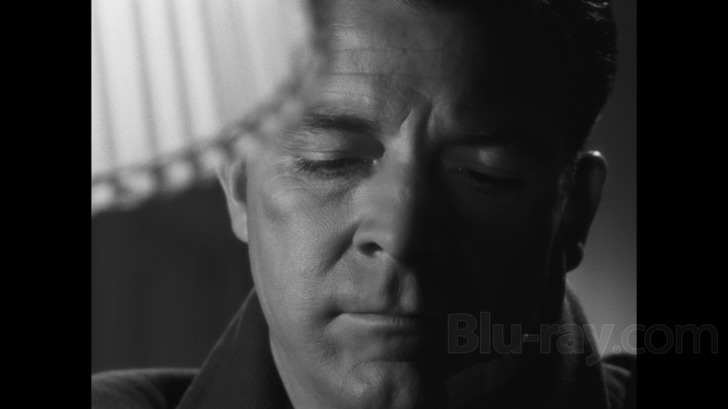
In a way, it’s kind of odd that Laura is considered a noir, and not just because there’s the absence of a typical femme fatale seductress. The main storyline itself, if looked at objectively, is really not noir material, and is in fact a more pedestrian mystery formulation with a pretty standard cop hero. It was the mood that Preminger imparted to the piece that probably most significantly impacted its entry into the ranks of noir, along with a few other flourishes like the Waldo Lydecker character. In that regard, Where the Sidewalk Ends fits much more snugly into the noir category, especially since it tends to deal with folks more on the margins of society than hoity toity Upper East Siders.
For the first fifteen minutes or so of the film, it almost appears that Where the Sidewalk Ends is going to document the activities of a basically decent if perhaps overly zealous cop named Mark Dixon (Dana Andrews). Dixon evidently always gets his man, but the fact that those arrested often seem to come into the station with bruises and other wounds leads Dixon’s superior Inspector Foley (Robert F. Simon) to issue Dixon a stern warning about his temper while also demoting Dixon and cautioning him that there could be another demotion back to beat cop status if he’s not careful.
When a traveling coterie of gamblers ends up getting into a fracas that leaves one participant dead, Dixon and his partner Paul Klein (Bert Freed) are assigned to the case, and Dixon is soon on the hunt for a low life named Ken Paine (Craig Stevens), whom a thug named Tommy Scalise (Gary Merrill) has fingered as the culprit in the killing. Paine is pretty inebriated and also nursing a bad facial wound by the time Dixon catches up to him, and when Paine goes ballistic, Dixon pops him a good one, one that’s so good in fact it ends up killing Paine. In a masterfully staged sequence, Preminger lets Andrews display a cartwheeling series of reactions to this turn of events. The upshot is that Dixon, after hearing that Paine actually was a war hero and perhaps only more recently a denizen of the lower ranks in life, decides that it’s best to cover up the death, even if it was accidental.
Up to this point, the screenplay by Ben Hecht has been lean and mean and at least relatively tethered to a (heightened?) reality. Unfortunately, several plot contrivances that soon begin accruing tend to push credulity to the breaking point. Dixon ends up meeting and interviewing Paine’s estranged wife Morgan Taylor-Paine (Gene Tierney), ultimately falling for her while also nursing his nagging conscience that he was the real party responsible for Paine’s death. Even more unlikely is the fact that Morgan’s raconteur father Jiggs Taylor (Tom Tully), has his own kind of preposterous history with Dixon. The intersection of so many coincidences is certainly nothing new in the annals of screenwriting, but here it seems tonally at odds with the kind of gritty ambience Preminger is going for.
The film goes off on a number of questionable but undeniably compelling tangents, as a series of suspects comes and goes. Ultimately, Jiggs is tagged as the most likely, leading to even more of a panging conscience for Dixon. Where the Sidewalk Ends is a fascinating study in a man knowing he’s circling the drain one way or the other, but who is attempting to keep others for whom he cares from following him in the watery swirl. Andrews, a somewhat stolid actor who probably isn’t given his due, does a fantastic job at depicting Dixon’s layers of deceit while also providing evidence that at his core, Dixon is indeed a decent guy. Tierney frankly doesn’t have a lot to do here other than to look dewy eyed and spout platitudes, but she’s effortlessly lovely and quite graceful. The supporting cast is superb and extremely colorful, providing another example of how brilliantly Preminger tended to populate the supposed sidelines of his films.
Where the Sidewalk Ends Blu-ray Movie, Video Quality 
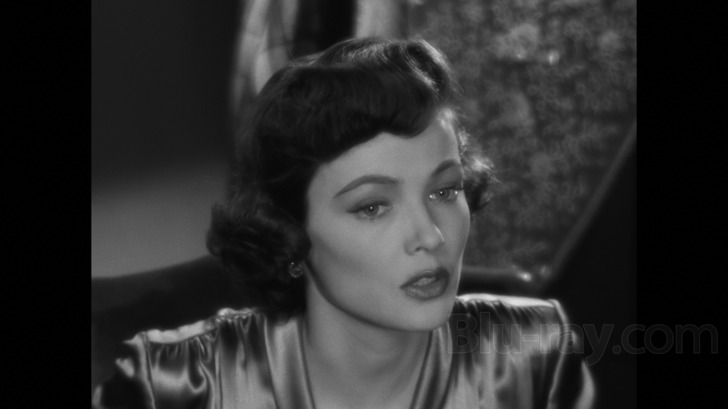
Where the Sidewalk Ends is presented on Blu-ray with an AVC encoded 1080p transfer in 1.33:1. It's odd in a way that cinematographer Joseph LaShelle isn't better remembered these days, for he contributed impeccable craft to an incredibly varied series of classic films, including the aforementioned Laura (for which he won the Academy Award), as well as Hangover Square, Captain from Castile, My Cousin Rachel, Marty, The Long, Hot Summer, The Apartment and How the West Was Won. The partnership between Preminger and LaShelle results in an almost balletic use of the camera throughout the film (as Muller repeatedly mentions in his winning commentary), with some incredibly graceful tracking and dolly shots adding "movement" to what are in essence pretty static and talky sequences. Preminger's brilliant blocking often creates fascinating vertical planes within the frame around which LaShelle plays with various focal points. This transfer preserves LaShelle's luminous cinematography, offering solid contrast, crisp blacks and a beautifully modulated gray scale, while also offering nice gradations between razor sharp focus within certain spaces inside the frame, while some outlying areas look relatively less sharp (intentionally so—see screenshot 10, where you'd think Andrews would be the focal point, but where he clearly isn't). Preminger and LaShelle are rather reserved in their use of close-ups, but when they do utilize them, detail is excellent (see screenshot 1). Elements are in pristine condition, with nary a nick or scratch (at least that I noticed), and the nicely textured grain field resolves very naturally. Though housed on a BD-25, there's not a glut of supplemental material on tap to take up valuable real estate, and as a result this fairly short film has more than enough breathing room for excellent compression.
Where the Sidewalk Ends Blu-ray Movie, Audio Quality 
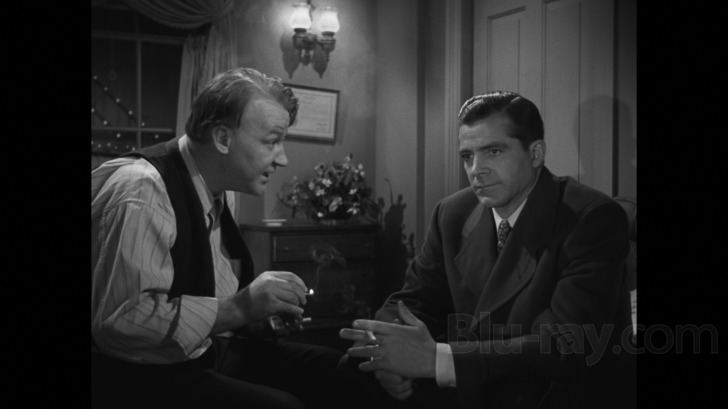
Where the Sidewalk Ends features a nice sounding DTS-HD Master Audio Mono track which more than capably supports the film's dialogue, sound effects and score (one which makes ubiquitous use of Alfred Newman's Street Scene. Dynamic range is actually fairly wide considering the era of the film, and there is no damage of any kind to warrant concern.
Where the Sidewalk Ends Blu-ray Movie, Special Features and Extras 
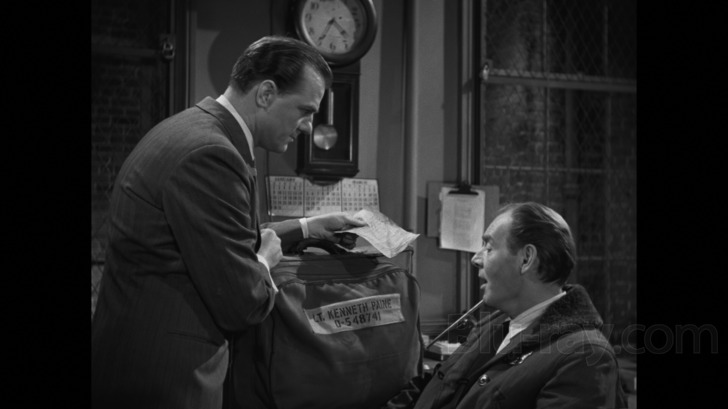
- Theatrical Trailer (480i; 1:47)
- Isolated Score Track is presented in DTS-HD Master Audio 2.0.
- Audio Commentary features Eddie Muller.
Where the Sidewalk Ends Blu-ray Movie, Overall Score and Recommendation 

Where the Sidewalk Ends probably relies a bit too much on too many convenient plot contrivances, an element which tends to rob the film of some of its down and dirty ambience, but Andrews is dynamite in a difficult role, and the film manages to traffic in both a kind of unseemliness and a weird nobility. There's a lot of "color" in this black and white film, and noir fans should have a field day. Technical merits are great, and Where the Sidewalk Ends comes Highly recommended.
Similar titles
Similar titles you might also like

Phantom Lady
1944

On Dangerous Ground
Warner Archive Collection
1951

Whirlpool
Limited Edition to 3000
1949

Boomerang
1947

In the Heat of the Night
1967

Witness to Murder
1954

I Wake Up Screaming
Hot Spot
1941

The Glass Key
1942

The Sleeping City
1950

Detective Story
1951

The Killers
1946

Blue Velvet
1986

Fallen Angel
1945

The Big Heat
Encore Edition | Limited Edition to 3000 - SOLD OUT
1953

I Confess
Warner Archive Collection
1953

Black Widow
Limited Edition to 3000
1954

The Big Combo
1955

Kiss Me Deadly
1955

The Blue Dahlia
1946

Crossfire
Warner Archive Collection
1947